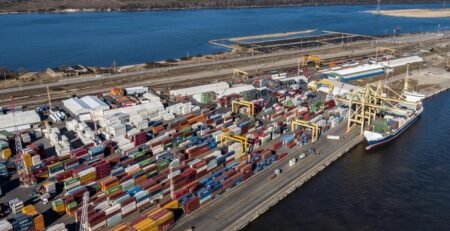New Iraq–Turkey–UAE Trade Corridor Cuts Transit Times by Half

By Maria Kalamatas — August 27, 2025
BAGHDAD — August 27, 2025. On a dusty highway outside Basra, convoys of trucks lined up under the morning sun, their trailers marked for Dubai, Doha, and beyond. This week, Iraqi officials confirmed the first successful trial of a multimodal trade corridor linking Iraq, Turkey, and the United Arab Emirates — a route that slashes journey times from 24 days to just 10.
The project, part of Iraq’s much-touted Development Road initiative, connects cargo by road from Basra to Turkey’s southern port of Mersin, where it is transferred to ships bound for the Gulf and Europe. For a region too often defined by bottlenecks and border delays, the corridor represents a rare story of speed.
“For once, we’re talking about time saved instead of time lost,” said Ali Karim, a Baghdad-based freight forwarder who coordinated the first trial shipments. “My client in Poland had goods reach the UAE in 10 days flat. That used to be unthinkable.”
Strategic ambitions
Iraq has pitched the Development Road as more than a transport project. By investing billions in highways, rail links, and logistics parks, Baghdad hopes to place itself back on the trade map as a bridge between Asia, the Middle East, and Europe. Turkish and Emirati partners, eager for alternatives to the congested Suez route, have shown strong interest.
Regional impact
Analysts say the corridor could redraw freight patterns in the Middle East. Shorter transit times mean lower costs, faster inventory cycles, and stronger appeal for manufacturers who rely on just-in-time delivery.
“This route is a potential game-changer,” noted Dr. Leila Mansour, a logistics scholar at the American University of Beirut. “If it scales, it will not only shift cargo away from sea-only routes but also give Iraq a political stake as a reliable transit country.”
Challenges ahead
Security and infrastructure remain concerns. Sections of the highway north of Baghdad still need upgrading, and customs procedures at border crossings are far from seamless. Shippers also worry about political instability that could disrupt operations.
Outlook
Despite the hurdles, the successful trial has energized regional logistics players. For Iraq, it is a rare chance to turn geography into leverage, rather than liability. For shippers, it is simple math: a route that once took nearly a month now takes a week and a half.
As one driver waiting at Basra’s checkpoint put it with a grin: “If this road stays open, we’ll all be working overtime.”
The post New Iraq–Turkey–UAE Trade Corridor Cuts Transit Times by Half appeared first on The Logistic News.
Share this post
Related
Posts
The United States seizes a 7th tanker: pressure mounts on sanctioned ships
New episode in the maritime tug-of-war over sanctions: the United States has seized a seventh tanker suspected of operating in...
China replaces US barrels with Canada: new impact on tanker routes
The geography of oil is shifting, and shipping feels it immediately. According to analyzes reported by BIMCO, Chinese crude oil...
The Port of Klaipėda Signs a Record Year Driven by Containers, LNG, and Ro-Ro
The Lithuanian port of Klaipėda announces a historic performance in 2025: 39 million tons handled, despite a tense geopolitical context...
Ocean Alliance maintains the detour via the Cape, while preparing a “Suez plan”
The Ocean Alliance (CMA CGM, COSCO Shipping, Evergreen, and OOCL) has just unveiled its “Day 10” East-West network, which will...




